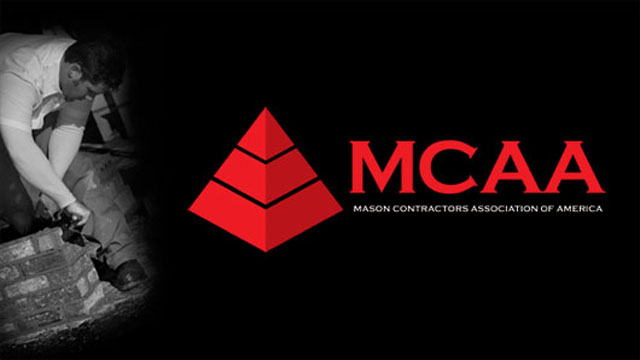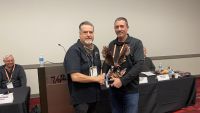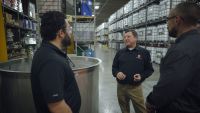MCAA Key Accomplishments 2011-2012
Your membership dues at work
By Mason Contractors Association of America

Membership dues paid to the Mason Contractors Association of America (MCAA) is the largest source of funding that we have. Its importance cannot be understated...it's a vital part of the association that enables us to continue to fight for our industry on behalf of all mason contractors. Our involvement on all fronts (from regulatory reform to education and training) continues to ensure the survivability and viability of our industry for generations to come. Below is a list of some of our recent successes supported by MCAA Membership dollars followed by a brief outlook for the coming year.
3% Government Withholding Bill gets Repealed
In the fall of 2011, the U.S. House of Representatives voted unanimously to repeal H.R. 674. Had it gone into effect, H.R. 674 would have required federal, state and local governments to withhold 3% of payments on all government contracts. As a result, President Obama signed the (repeal) bill into law on November 21, 2011. The MCAA was opposed to the 3% withholding from the beginning and worked hard to urge Congress to repeal this law. Thanks to everyone who contacted their Senators and Representatives to help make this victory possible.MILCON Lifecycle Language
The MCAA was successful in the fall of 2011 in getting 50 year lifecycle language inserted into the appropriations bill. The language states that the military branches need to consider 50 year lifecycle costs when selecting materials for their construction projects. There has been a noted change since, in the allocation of masonry in new construction projects.MCAA Agreement with NCCER
In early 2012 the MCAA signed an agreement with the National Center For Construction Education and Research (NCCER) to merge our two masonry apprenticeship textbooks. The NCCER has a very large network of programs already assembled throughout the US teaching a variety of Construction trades. The new alliance will allow MCAA to tap into that network and promote new programs for masonry within these schools. Many of these schools are secondary schools with vocational programs. In addition, the MCAA is working with the Masonry Association of Florida (MAF) to adopt their successful apprenticeship program utilizing the NCCER programs and expand them outside the state of Florida. In 2012 the MCAA plans to pilot a program in the state of AZ and expand beyond AZ in 2013.BIM Research Project
In late spring of 2012 the MCAA pushed and promoted a new BIM research project to identify a roadmap to successful implementation of a masonry BIM application. The MCAA asked David Biggs to spearhead the effort and a group of allied industry groups have since funded a study by Georgia Tech (to be completed in early 2013) which will give the industry a true assessment of what it will take and how long it will take to implement a masonry BIM component for designers software.MCAA Hall of Fame
The MCAA inducted the first class of Masonry Hall of Fame honorees. The Masonry Hall of Fame was developed to honor those who have served the masonry industry throughout a lifetime and have had a driven passion for it. The four honorees were: Glenn Sipe of North Carolina, Richard Felice of Iowa, Jerry Painter of Florida and posthumously Dee Brown of Texas.In the year ahead there are several projects already in development. The following are projects identified to occur in 2012-13:
BIM Software Development
Upon completion of the roadmap to implement a masonry BIM component, the MCAA expects to be a part of the undertaking to raise dollars and start the development of a BIM masonry component. It is expected that this next step will require industry to raise at least 1.5 million dollars so our task ahead will be great. The end result will dwarf initial investment as a BIM masonry component should revolutionize every aspect of our industry, including and most importantly getting masonry included in the design process at the very beginning.Single Wythe Wall Study
The MCAA is partnering with the IMI to engage the University of Louisville to conduct a study which will help make it possible to design single wythe masonry walls in climate zones 3-6 in spite of the new IECC code. We are excited to see this study begin and expect results in a relatively short period of time and look to implement the results in the 2012-2013 year.New Learning Experiences for Contractors
In 2012-2013 the MCAA will introduce new "Networking Sessions" at our two face-to-face meetings. These new sessions will replace our old educational programs. At our mid-year meeting we plan to break into five breakout sessions by employment classification. Participants will then discuss some pre-developed questions about best practices within their company and then have an open forum on topics the participants would like to learn more about.These opportunities will offer real world advice and input from contractors across the country. It will take our most valuable resource (our members) and have them share their experiences and business practices. We will then expand the program to our convention. Hanley Wood has agreed to create a classroom on the show floor, which will conduct a continuation of the mid-year experience. The five job classifications will have time slots allocated for their group to meet on the show floor of the North Hall of the Las Vegas Convention Center. They will then engage again in discussion of best practices and again have the opportunity to explore what other similar mason contractors do regarding a series of topics back home. These shared experiences are invaluable and our members have found them to be the best education one can receive.
As the year develops there will be undoubtedly more exciting opportunities for our association to participate in. We need your continued support to maximize our opportunities and serve the needs of our industry.
About the Author
The Mason Contractors Association of America (MCAA) is the national trade association representing mason contractors. The MCAA is committed to preserving and promoting the masonry industry by providing continuing education, advocating fair codes and standards, fostering a safe work environment, recruiting future manpower, and marketing the benefits of masonry materials. Visit www.masoncontractors.org to learn more.















